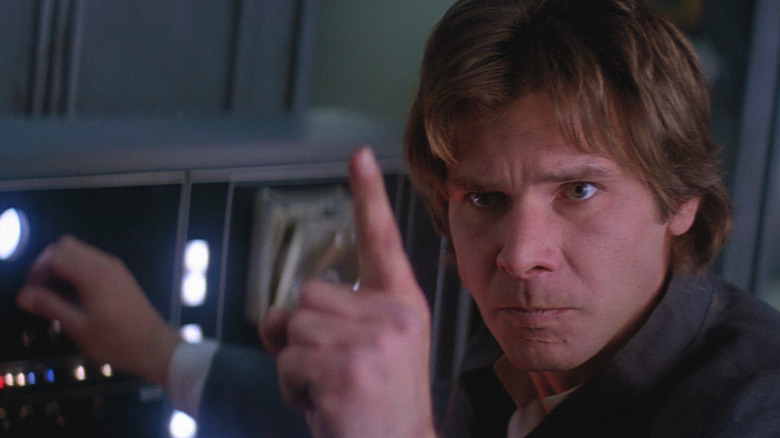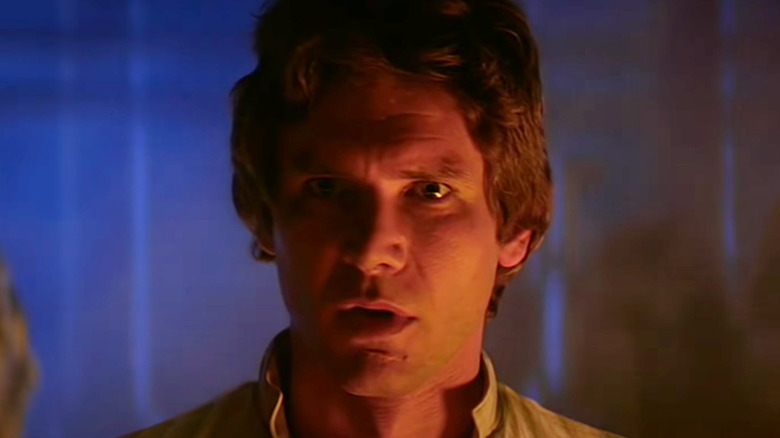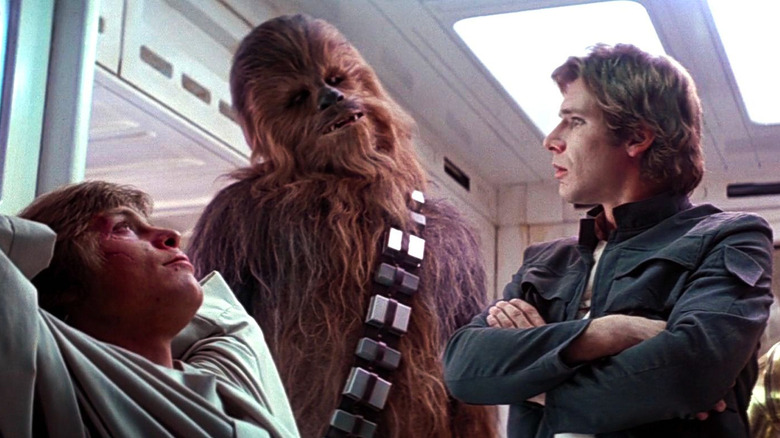The Empire Strikes Back Scene You Probably Didn't Know Was Improvised
"Star Wars" is as much a love story as it is a fairy tale about laser swords in space. The love coursing through George Lucas' sprawling dynasty isn't always the romantic kind, but Han Solo and Leia Organa's romance is arguably the heart of the original trilogy. Their iconic exchange in "Star Wars: Episode V – The Empire Strikes Back" — where Leia blurts out her first "I love you," and Han quips back with a painfully-cool "I know" before descending into his carbonite prison — is second only to Darth Vader's "I am your father." It's been parroted by many a "Star Wars"-loving couple, and affixed to countless "Star Wars" memorabilia (official or otherwise), which is why it's still surprising that Han's pitch perfect response wasn't always such a sure thing.
The "Empire Strikes Back" set wasn't nearly as troubled as some of the more recent "Star Wars" productions, but there was still a fair amount of conflict surrounding the script. It was initially penned by Leigh Brackett (of "The Big Sleep" and "The Long Goodbye" fame), but later rewritten by Lucas and "Star Wars" lucky charm Lawrence Kasdan. And while that script serves as a textbook example of sequel writing at its finest, Han and Leia's scenes in particular endured a few significant changes.
How "I know" came to be
Han and Leia's fateful farewell is a bit different in the original script. Leia does say "I love you," along with "I couldn't tell you before, but it's true." Han responds with "Just remember that, 'cause I'll be back," a line that didn't really work at all. In a 2011 interview with Jon Favreau, Harrison Ford confirmed that Lucas had argued for a simpler "I love you too," which felt tepid at best, grossly out of character at worst:
"I thought it was a lost opportunity. This character has never behaved so unabashedly emotional and conventional before ... You want your badasses to be a badass till the end. You want them to go down the way they lived."
Irvin Kershner, who had stepped in to direct while Lucas produced, was not shy about altering Kasdan's script in any capacity. The director was known to workshop scenes with actors before (and sometimes in the midst of) shooting the scene in question, and Han and Leia's farewell was no different. Kershner worked closely with Ford on the day of shooting. Their conversation was even recorded on set by unit publicist Alan Arnold, and later transcribed for author J.W. Rinzler's book "The Making of The Empire Strikes Back."
Their conversation confirms that "I know" was, in fact, all Harrison Ford. "If she says, 'I love you,' and I say, 'I know,' it's beautiful and it's acceptable and it's funny," the actor told Kershner. "The point is, I'm not worried about myself anymore; I'm worried about her."
Pushback and payoff
Kershner, obviously, had no issue giving Ford so much control. "I regarded that scene as entirely his," he told Rinzler, "which is why I gave him so much opportunity to tell me how he thought we should treat it." Unfortunately, not everyone involved left the set feeling equally considered.
According to Ford, Lucas "went apes***" when he learned about the change, thinking that the new line "would get a bad laugh" from audiences. Fortunately, Kershner had filmed one take of the line, as written, for safety. But before "I love you too" all-out replaced "I know," Lucas tested Ford's choice at an early screening.
Both Ford and Kershner were present at the screening, and though "I know" did get one laugh, the actor remembers it as "a laugh of recognition." Kershner further recounted the fan reception in a 2010 interview with Vanity Fair: "People came up and said that is the most wonderful line and it worked. So George decided not to have the second screening."
The director also recalled that Ford's improv "caused tension" with Carrie Fisher, who later herself commented on her costar's off-the-cuff rewrites. "Harrison Ford was rewriting his stuff in all the Star Wars movies," Fisher told The Phoenix New Times in 2008. "It became annoying because it impacted my stuff." It wasn't until "Return of the Jedi" that Fisher would have the chance to rewrite her own lines, and it was there that her career as a renowned script doctor first began to take shape.


